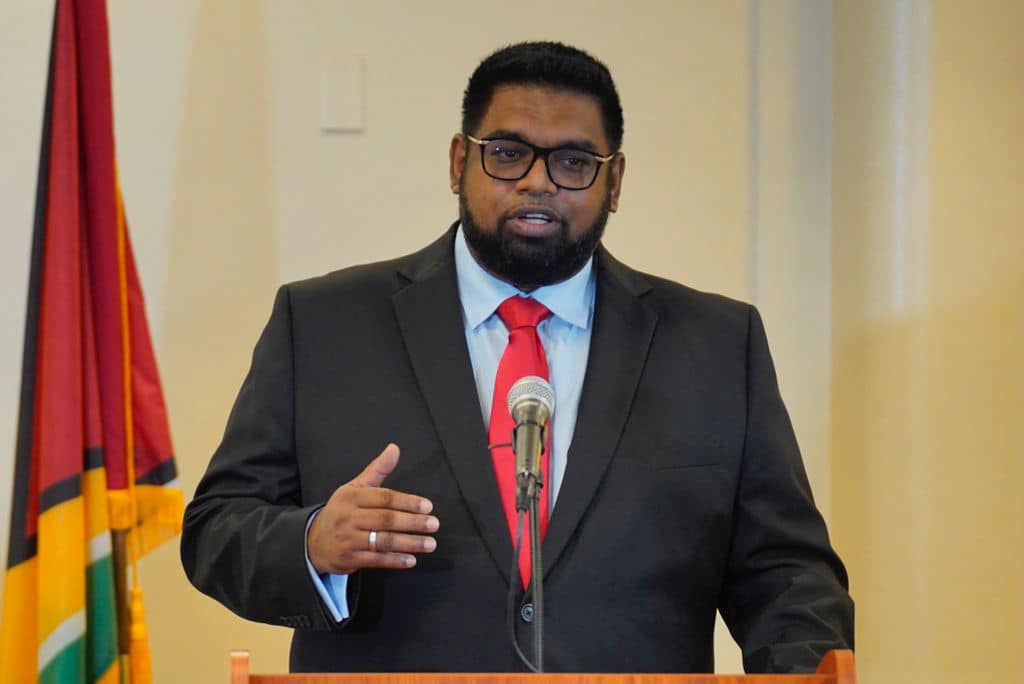By Kurt Campbell
Urging more local consumption in response to the global supply chain crisis brought on by the COVID-19 pandemic, President Dr. Irfaan Ali on Friday assured that his government was working to tackle global commodity shortage and price increases which are also affecting Guyana.
New measures by the government will add to several incentives over the last year which included cash transfers and the removal/reduction of taxes and other fees.
Dr. Ali, during an address to the nation on Friday, said the incentives are designed to cushion the global challenge and the effect it has on the local economy.
He explained, for instance, that with prices for fertilizers surging globally, and fertilizer plants reducing production or closing shop, steps are being taken to address that.
“We are not sitting down and waiting for the situation to correct itself, your government is actively pursuing bilateral discussions to have a direct import of fertilizer,” the Head of State said.
To reduce the effect of the global crisis on Guyana, Dr. Ali reminded of his promised salary increase for public servants and support for the joint services and frontline workers.
“We will continue to pursue efforts that minimise the effects on your pockets,” he said.
He urged businesses to ensure that they pass on the benefits of the government’s intervention to consumers. “You should not look at profiteering; we are in this together.”
Dr. Ali said the current circumstances are threatened by the forecast that existing shortages and price increase will continue well into 2022. Already, citizens are dealing with shortages of construction materials and food items with prices already increasing.
According to Dr. Ali, an assessment of what is happening in major economies like China shows that they are experiencing the fastest growth in increased prices since the 1990s.
In the United States of America, the consumer prices index for October showed prices rose 6.2 per cent over the last twelve months. According to Dr. Ali, it is the highest in the last three decades.
The government has been implementing measures in the midst of the pandemic to help citizens navigate these unprecedented times, with the removal of Value-Added Tax (VAT) on water and electricity, as well as on basic food items, basic household necessities, and on medical and educational supplies.
The Ali administration also moved to make homeownership and home construction more affordable by removing the VAT on basic construction materials, increasing the ceilings on low-income mortgage loans from $8 million to $12 million and on loans granted by the New Building Society from $12 million to $15 million, and doubling the ceiling on loans eligible for mortgage interest relief from $15 to $30 million.
Two major sets of interventions were also made to help farmers affected by flooding caused by the May-June rains, as well as to ease the impact of imported freight charges on the cost of living.
President Ali had announced a $7.8 billion package of assistance to farmers and households to help get them back on their feet and help bolster production in the wake of the devastating floods they faced, while a cap was introduced on the freight charges used to calculate taxes on imports.
Additionally, a further set of measures were announced, aimed at providing $2.6 billion worth of additional support to the most vulnerable in society.
These include a one-off grant of $25,000 to all old-age pensioners, equivalent to one month of old-age pension, benefitting 65,000 persons; a one-off grant of $25,000 to all public assistance recipients and persons living with disabilities, benefitting 25,000 persons; and an electricity credit paid to GPL on behalf of households consuming not more than 75 kilowatt-hours per month.
The credit to each household is equivalent to one month of their electricity bill and will inject more than $200 million of disposable income to more than 40,000 households.












